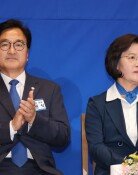[Editorial] Priority Should Be Given to a Close Examination of the Remittance
[Editorial] Priority Should Be Given to a Close Examination of the Remittance
Posted February. 07, 2003 22:50,
Although there are signs that the ruling and the opposition parties are getting closer to end the dispute surrounding Hyundai Merchant Marines secret money remittance to North Korea, they are still taking pains to find a common ground to compromise with each other. There are options on the table to put an end to the dispute such as off-the- record testimonies by relevant figures before the National Assembly, President Kim Dae-jungs public apology for having deceiving the public, and the appointment of the independent counsel. However, the two rival parties are taking different approaches to settle the issue. There is no reason for the two major parties to have such difficulties in finding common grounds to address the issue. It is unnecessary for the ruing Millennium Democratic Party to oppose an investigation into the scandal by special counsels from the outset and for the opposition Grand National Party to demand for the appointment of the independent counsel in a hurried manner. It necessary, the three options should be carried out in accordance with required procedures.
Shedding light on all the truths should come first in all suspicious cases before asking responsibilities for wrong doings. In this context, it may not that bad to hear testimonies from people concerned first because it may be conducive in the event of an investigation by special counsel. Concerned figures should offer sincere testimonies. If their testimonies are only serving as explanations to justify their actions, it may lead to the ever-widening public suspicions, overshadowing the purpose of those testimonies.
There are two technical issues involved in the off-the-record testimony. One is there is no instrument to prove whether the testimony is true or not and the other is it is difficult to ask for the understanding of the public that cant have access to the testimonies given by those concerned people. Fortunately, if the political circle judges that the testimonies are trustworthy, verification of the genuineness of the testimonies may be unnecessary. In the case of that, the political circle should exert vigorous efforts to have the public understand the peculiar circumstances of the inter-Korean relationship.
If the opposite development takes place, it is unavoidable to push ahead with forceful procedures to clarify the issue. In case of that, the majority GNP, which controls the 272 seats of the parliament, can go ahead with the appointment of the independent counsel, if it wants, as the National Assembly has authority to implement the forceful procedures. In addition, in accordance with the outcomes of the investigations, the political circle may face a situation in which they may impose legal punishment beyond political responsibilities on those concerned people. Taking all the possible options into consideration, it is not that complicate matter.
Nevertheless, the reason why the ruling and the opposition parties are taking pains to find a common ground to resolve the issue seems to be a chronic mistrust within the political arena. It seems that the opposition party always raises suspicion that the ruling party is trying to cover up suspicious cases, while the ruling party is blaming the opposition party for political maneuvering. If so, the political circle fails to realize that the public have a critical eye to judge what is right or wrong. If the ruling and the opposition parties bear in mind the fact that they have to clarify the secret money transfer to the North, they can easily find a common ground to put an end to the political dispute.







